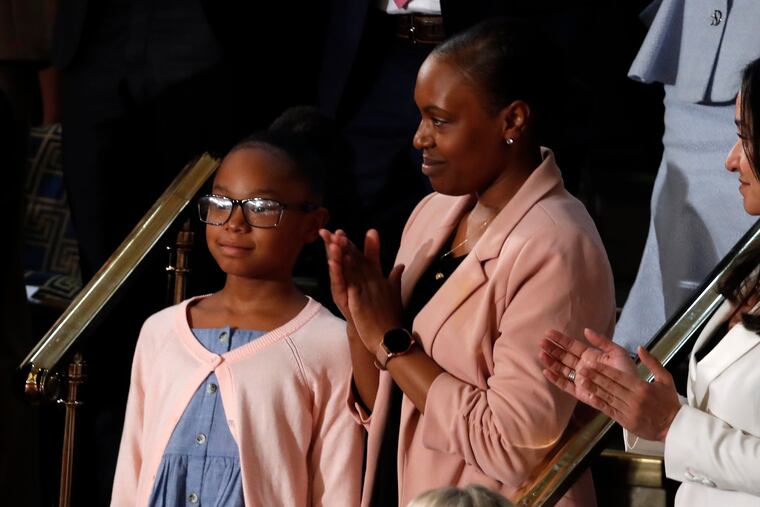Shame on Trump, DeVos for using Philly girl to manipulate message on school choice | Opinion
In his State of the Union, Trump, a champion of charter schools, bashed "government schools," and offered Philly's Janiyah Davis a scholarship. The problem: Janiyah already attends a charter.

In the 1920s, automobile titan Henry Ford moved the one-room schoolhouse of his youth to the living-history museum he built in Dearborn, Mich. Ford recruited 32 local children to attend the school for free, greeting each one personally as they arrived in 1929. And he paid a lone female teacher to take charge, just like the woman who had instructed him as a boy.
I thought of Ford as I read about Philadelphia fourth-grader Janiyah Davis, who appeared at the State of the Union address last week. President Donald Trump attacked “failing government schools,” reiterating his demand for federal tax credits that would make more scholarship money available for students like Janiyah to attend private and parochial schools.
That effort is stalled in Congress, so Trump announced that Education Secretary Betsy DeVos — like Ford, a wealthy Michigan scion — would fund Janiyah’s scholarship herself. “You will soon be heading to the school of your choice,” Trump told Janiyah.
But Janiyah already attends the school of her choice. It’s a “government school,” and it’s hardly failing; indeed, it’s one of the most sought-after charter schools in Philadelphia. And that points to a huge difference between these two figures: Ford used his largesse to build up public schools, whereas DeVos — like Trump — is trying to bring them down.
That’s why Trump and DeVos have consistently called them “government schools,” which is calculated to alienate voters. Americans might like their congressional representative — or their school board president — but they don’t like “government,” which conjures bloat, inefficiency, and corruption.
So when Republicans were battling Barack Obama over health care in 2009, they falsely called his plan a “government takeover” of the sector. And a South Carolina man warned his congressman in 2009 to “keep your government hands off my Medicare,” because he liked Medicare — which is a government-run program, of course — but hated the government.
That’s a great way to slur public schools, too. In a 2018 address to a Catholic foundation, DeVos said that “government schools” were responsible for the decline of America’s standing in the world.
Some public schools are failing. But probably not Math, Science, and Technology Community Charter School III, which Janiyah entered when the gleaming new facility opened last September. It has received 6,500 applications for 100 seats next year.
And, yes, charter schools are “government schools.” Although privately operated, they’re funded by taxpayers — and they’re free.
But that’s not enough “choice” for DeVos, who wants kids like Janiyah to be able to attend independent and religious schools on the public’s dime as well. Janiyah went to the Olney Christian School for a few years, but her mother couldn’t afford its tuition. She was delighted when Janiyah was accepted to her charter school, which Stephanie Davis called a “great opportunity.”
Ironically, DeVos has championed charter schools as well. In the quest for taxpayer-funded private schools, however, she is willing to throw all “government schools” under the school bus.
And that’s how she’s different from Ford, who used his riches to promote public education. Ford moved a second one-room school to Dearborn, along with the childhood home of Pennsylvania’s William Holmes McGuffey, author of the famous textbook series.
He also took his show on the road, sponsoring a traveling exhibit called “Schoolroom Progress” that moved around the country on a railroad car. It began with a one-room school and concluded with a modern classroom.
Ford continued to pay for students to attend his preserved historical schools in Dearborn, just as DeVos has offered to pick up Janiyah’s private-school tuition. But Ford was using private money to enhance support for public schools, whereas DeVos wants to use public money to finance private ones.
Stephanie Davis says she doesn’t know whether Janiyah will stay at her current school or go elsewhere. But here’s what we do know: Janiyah has already benefitted from “government schools.” Shame on us, for making her a poster child in the political vendetta against them.
Jonathan Zimmerman teaches education and history at the University of Pennsylvania. He is the author of “Small Wonder: The Little Red Schoolhouse in History and Memory” (Yale University Press).